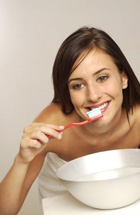 According to a dentist in Leeds, there is no precise science to brushing you teeth correctly. Each mouth is unique and has different requirements and there are so many factors to consider before you even put the brush into your mouth. Gums and teeth may react differently to soft and hard brushes- small, large and angled heads and let’s not forget the electric choice. Then there’s the subject of toothpastes; these too come in different guises. Some may be suited for sensitive teeth, some have whitening properties, but all should come recommended. Finding the brush and paste that suits you is down to experimenting, but consulting with your dentist will make your choices easier. When we finally arrive at the brushing stage, it is generally considered that you should start at the front of the mouth on the inside and work towards the back, bringing the brush off the gums- the same procedure is applied on the outside. In the case of electric brushes, the work is done for you. There are many to choose from and again it’s down to personal choice, but in time, you will find what’s good for you- it’s a matter of ‘horses for courses’. To ensure success through brushing, flossing and rinsing are a natural support for the best results.
According to a dentist in Leeds, there is no precise science to brushing you teeth correctly. Each mouth is unique and has different requirements and there are so many factors to consider before you even put the brush into your mouth. Gums and teeth may react differently to soft and hard brushes- small, large and angled heads and let’s not forget the electric choice. Then there’s the subject of toothpastes; these too come in different guises. Some may be suited for sensitive teeth, some have whitening properties, but all should come recommended. Finding the brush and paste that suits you is down to experimenting, but consulting with your dentist will make your choices easier. When we finally arrive at the brushing stage, it is generally considered that you should start at the front of the mouth on the inside and work towards the back, bringing the brush off the gums- the same procedure is applied on the outside. In the case of electric brushes, the work is done for you. There are many to choose from and again it’s down to personal choice, but in time, you will find what’s good for you- it’s a matter of ‘horses for courses’. To ensure success through brushing, flossing and rinsing are a natural support for the best results.





 According to a dentist from Leeds, people don’t take enough trouble to look after their teeth, which is shocking considering how easy it is to do. Most people persist in retaining habits and lifestyles that cause the erosion of their dental enamel, and which leads to a lot of problems for them.
According to a dentist from Leeds, people don’t take enough trouble to look after their teeth, which is shocking considering how easy it is to do. Most people persist in retaining habits and lifestyles that cause the erosion of their dental enamel, and which leads to a lot of problems for them. Preventing dental treatment is a better way for your dentist to help you keep your teeth in good order, and that’s exactly what they do best says a Central Leeds dentist. If you take your dentists advice then you`ll prevent gum disease and save yourself a lot of money and time in the chair. It isn`t common sense for your dentist to keep working on repairing your teeth, this just restricts their time and prevents them from taking on more patients. A good hygiene format is what will prevent teeth problems, and your practice has an experienced and well trained hygiene nurse whose job it is to advise you. Brushing with a good toothbrush and the right one too, will also go some way to keeping gum disease away. Flossing and a good mouthwash will also help. Gum disease is caused by bad bacteria that feeds off the food residue that is left every time we put food into our mouths. The bacteria produces acid which then wears down the protective enamel. It also gets onto the gums and makes them sore and soft, this causes bleeding which then allows the bacteria to enter the blood stream and cause havoc. This is the main cause of premature tooth loss in most adults. This can all be avoided by a simple, but affective oral hygiene regime. Carrying a flossing stick will also help, as we all tend to eat a snack in between meals. This is just as damaging as a full meal, in fact it is more damaging at times as these snacks tend to be sugary, and that’s what attracts the bacteria more. At night the saliva gland will go sleep when you do, this stops acid being neutralised and damages your teeth quite quickly. Just a simple thing like having a glass of water by the bed, and sipping it through the night, will go a long way to helping you keep your teeth longer.
Preventing dental treatment is a better way for your dentist to help you keep your teeth in good order, and that’s exactly what they do best says a Central Leeds dentist. If you take your dentists advice then you`ll prevent gum disease and save yourself a lot of money and time in the chair. It isn`t common sense for your dentist to keep working on repairing your teeth, this just restricts their time and prevents them from taking on more patients. A good hygiene format is what will prevent teeth problems, and your practice has an experienced and well trained hygiene nurse whose job it is to advise you. Brushing with a good toothbrush and the right one too, will also go some way to keeping gum disease away. Flossing and a good mouthwash will also help. Gum disease is caused by bad bacteria that feeds off the food residue that is left every time we put food into our mouths. The bacteria produces acid which then wears down the protective enamel. It also gets onto the gums and makes them sore and soft, this causes bleeding which then allows the bacteria to enter the blood stream and cause havoc. This is the main cause of premature tooth loss in most adults. This can all be avoided by a simple, but affective oral hygiene regime. Carrying a flossing stick will also help, as we all tend to eat a snack in between meals. This is just as damaging as a full meal, in fact it is more damaging at times as these snacks tend to be sugary, and that’s what attracts the bacteria more. At night the saliva gland will go sleep when you do, this stops acid being neutralised and damages your teeth quite quickly. Just a simple thing like having a glass of water by the bed, and sipping it through the night, will go a long way to helping you keep your teeth longer. Taking good care of your teeth is very important. If you look after your teeth well, they will last you a lifetime but the consequences of ignoring dental hygiene can result in pain, expensive treatment and embarrassing dental conditions. From an early age we are all taught how to clean our teeth and the very good reasons for doing so, but often as people get older they become complacent or forget to look after their teeth as well as they can. Leeds dentists are urging all patients to care more for their teeth and can offer tips at check up appointments, as well as looking for any signs of decay.
Taking good care of your teeth is very important. If you look after your teeth well, they will last you a lifetime but the consequences of ignoring dental hygiene can result in pain, expensive treatment and embarrassing dental conditions. From an early age we are all taught how to clean our teeth and the very good reasons for doing so, but often as people get older they become complacent or forget to look after their teeth as well as they can. Leeds dentists are urging all patients to care more for their teeth and can offer tips at check up appointments, as well as looking for any signs of decay.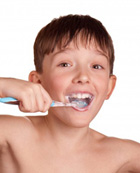 Everyone has heard the word plaque countless times in adverts for dental products but how many people actually really understand what it is and why it is so dangerous for your teeth? Plaque is a filmy substance comprised of bacteria and decaying food debris that clings to the surface of the teeth. As the bacteria and food decay they release chemicals, collectively known as plaque acid, which erodes the surface enamel of the teeth and also irritates gum tissue. If allowed to remain in the mouth and continually release acid, plaque can be the cause of both tooth decay and gum disease. It will also harden over time so that it cannot be removed by conventional cleaning. This hardened plaque is commonly known as tartar.
Everyone has heard the word plaque countless times in adverts for dental products but how many people actually really understand what it is and why it is so dangerous for your teeth? Plaque is a filmy substance comprised of bacteria and decaying food debris that clings to the surface of the teeth. As the bacteria and food decay they release chemicals, collectively known as plaque acid, which erodes the surface enamel of the teeth and also irritates gum tissue. If allowed to remain in the mouth and continually release acid, plaque can be the cause of both tooth decay and gum disease. It will also harden over time so that it cannot be removed by conventional cleaning. This hardened plaque is commonly known as tartar.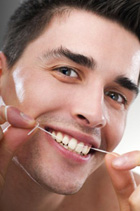 Central Leeds dentists are always stressing the importance of flossing to all patients at dental check ups. This is because despite all the evidence that points to the benefits of flossing, there is still only a relatively small percentage of people who actually do it. Nearly everyone brushes their teeth, but many people are perhaps wrongly convinced that this enough.
Central Leeds dentists are always stressing the importance of flossing to all patients at dental check ups. This is because despite all the evidence that points to the benefits of flossing, there is still only a relatively small percentage of people who actually do it. Nearly everyone brushes their teeth, but many people are perhaps wrongly convinced that this enough.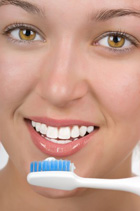 Brushing your teeth is only part of a good oral hygiene regime. Although brushing is very important for removing plaque and keeping teeth clean and free of bacteria, there are other important ways of maintaining the health of your teeth and gums.
Brushing your teeth is only part of a good oral hygiene regime. Although brushing is very important for removing plaque and keeping teeth clean and free of bacteria, there are other important ways of maintaining the health of your teeth and gums.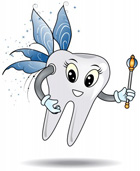 Maintaining good oral hygiene is about more than just brushing, yet so many of use rely entirely on brushing to keep our teeth clean and healthy. But we may be playing a dangerous game if we don’t pay enough attention to the other areas of the mouth.
Maintaining good oral hygiene is about more than just brushing, yet so many of use rely entirely on brushing to keep our teeth clean and healthy. But we may be playing a dangerous game if we don’t pay enough attention to the other areas of the mouth.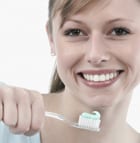 The most important part of dental care happens at home according to dentists. Regular check ups can help to prevent more serious dental concerns and ensure that your teeth are being kept as healthy as possible, but it is really effective brushing and flossing that are the most important defence against decay and disease. This is because when it comes to dentistry, prevention is much better than cure.
The most important part of dental care happens at home according to dentists. Regular check ups can help to prevent more serious dental concerns and ensure that your teeth are being kept as healthy as possible, but it is really effective brushing and flossing that are the most important defence against decay and disease. This is because when it comes to dentistry, prevention is much better than cure. There are a number of very important reasons why you should floss every day. Flossing is often seen as not as important as brushing but this is not necessarily true. Brushing your teeth cleans the flat surfaces of the front and back of the teeth but it can’t reach certain parts of the teeth that are harder to get to. This includes the area between the teeth, which is too narrow for the bristles of a brush, and the areas around the base of the teeth and below the gum line.
There are a number of very important reasons why you should floss every day. Flossing is often seen as not as important as brushing but this is not necessarily true. Brushing your teeth cleans the flat surfaces of the front and back of the teeth but it can’t reach certain parts of the teeth that are harder to get to. This includes the area between the teeth, which is too narrow for the bristles of a brush, and the areas around the base of the teeth and below the gum line.

